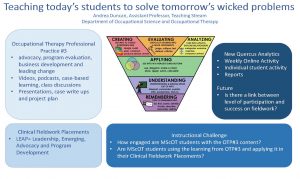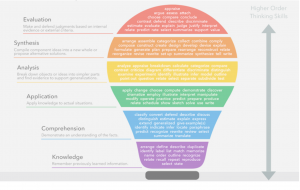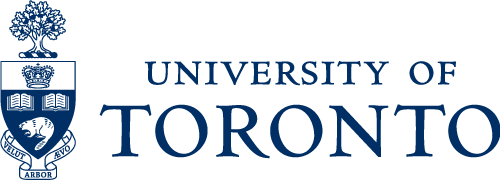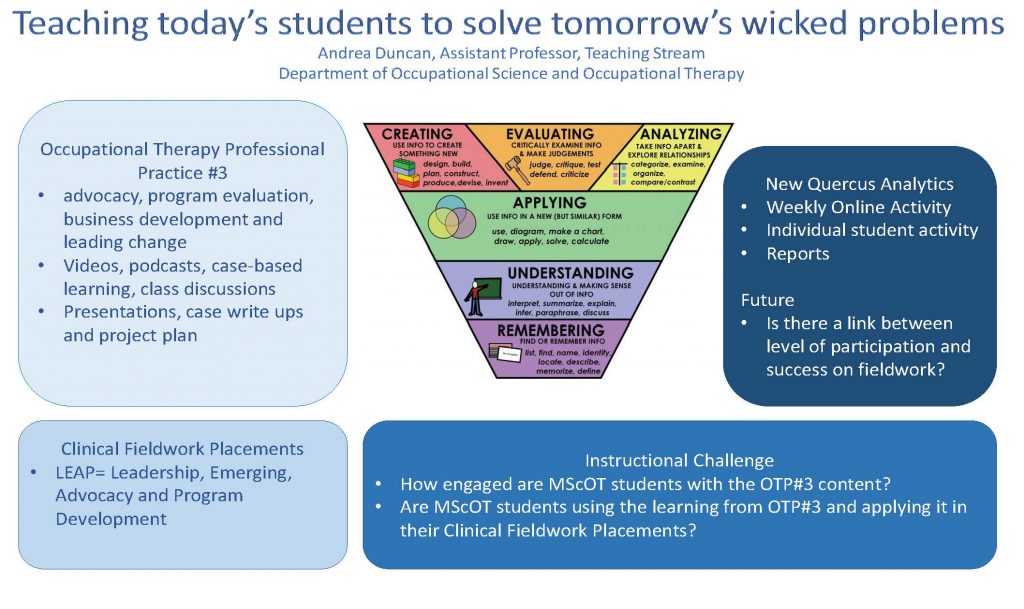Andrea Duncan
Course/ProgramOCT1233H – Occupational Therapy Professional Practice |
 Poster presentation – Teaching and Learning Symposium, May 2021 Poster presentation – Teaching and Learning Symposium, May 2021 |
Design ContextOCT1233H – Occupational Therapy Professional Practice is a second-year course for MScOT students that teaches about advocacy, program evaluation, business development and leading change. Following this course, students participate in OCT1282Y – Fieldwork #3, which is clinical fieldwork placement. The fieldwork placements in this block are called LEAP placements (Leadership, Emerging, Advocacy and Program Development) and these are typically completed with non-traditional health care and social services organizations. In OCT1282Y students are expected to apply the learnings from OCT1233H and create a system level impact on the organizations in which they are placed. |
 |
Instructional Challenge
Bloom’s Taxonomy is the conceptual model that guides the approach to establishing learning objectives, creating teaching strategies and building a learning experience that moves students to a higher level of skill and intellectual engagement. Traditional teaching methods are useful for imparting knowledge to students so they can remember or understand concepts. In 2019 OCT1233 transitioned to a hybrid model with support from the D3:QA project. At this time, it is unknown if this “just in time” classroom learning is preparing students for real world application. Specifically, it is unknown if and how students are using the knowledge and comprehension from the in-class experience of OCT1233 to apply, synthesize and create new evidence during the fieldwork experience of OCT1282Y.
Design Strategy
The challenge as educators is to create learning environments and evaluation models that reach for the top of the taxonomy in which students are required to analyze, evaluate and create new work based on their knowledge, skills and affect. This desire creates an ideal situation to increase the utilization of online methods for educating and evaluating students. OCT1233H has always embraced a flipped classroom approach to teaching. The use of flipped classroom was believed to prepare students to not just learn and understand concepts, but to enable them to apply these learnings to cases and real-world scenarios.
In the transition to a hybrid model of education, a series of short ten to fifteen-minute pre-recorded lectures on core topics were developed. Additional online activities such as group discussions, readings, videos, podcasts and assignments were used to facilitate students’ learning from remembering and understanding to applying, analyzing, and evaluating. In class time was then used for the instructor to 1) ensure students have learned the core concepts and 2) facilitate higher levels of application of the material to cases, debates and complex “wicked” problems. Traditional evaluation methods were still used to calculate the students’ grade.
Use of Data to Inform Design Iteration and Instruction
As educators, we typically have only our own self reflections and student course evaluations as feedback mechanisms on the effect of our teaching methods. Both of these mechanisms have been shown to be poor assessments of teaching and student knowledge and skill development. The exciting aspect of this proposed hybrid course redesign is that Quercus Analytics will allow for stronger evaluative methods of pedagogy and a deeper understanding of student level of interaction. Specifically, students are now able to access the online portions of OCT1233H when they complete OCT1282Y. The Quercus Analytics will allow for an instructor understanding of how often students return to the OCT1233H course material to during the timeframe they are completing OCT1282Y. This will be especially informative for how the course content impacts students’ future learning.
Next Steps
Quercus Analytics will be used to track how often students return to the OCT1233H material. This will occur during the time period April 12th to June 18th, 2021. Additionally, there will be efforts made to determine if there is a connection between success in OCT1282Y and the frequency in which OCT1233H materials are accessed.
Poster
Presented at the Teaching and Learning Symposium, May 2021.
Click to download poster PDF in a new tab

